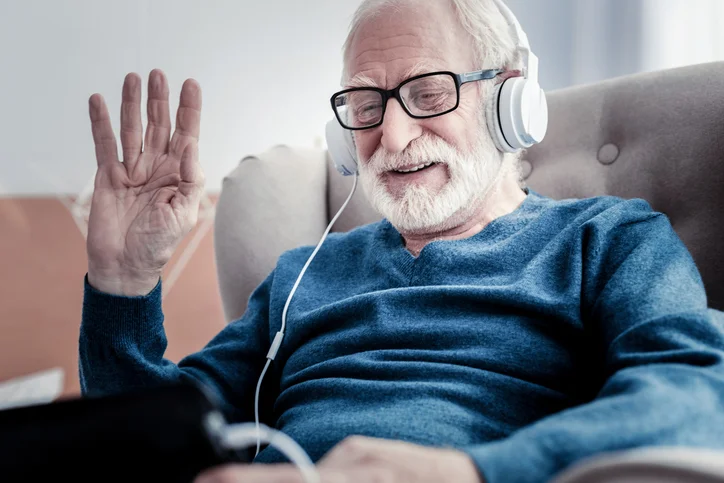The number of older adults embracing new technology, particularly in the form of smartphones, smart devices, and tablets, is on the rise. While these devices may take a little effort to set up and practice using them, the barrier to entry on modern tech is lower than ever before. Let’s explore some of the ways today’s technology is benefiting seniors—and why you might want to take notice.
Social Connectivity
Social isolation has the potential to affect anyone, and numerous studies have shown that older adults may be more susceptible to feelings of isolation and depression. Maintaining social connections and making friends are two actions thought to positively influence health.
There are many ways that seniors can stay connected socially using technology. With smartphones or tablets, messaging loved ones through text message or using video chat apps to have more in-depth “face-to-face” virtual conversations only requires a few screen taps.
Meanwhile, popular social media applications, such as Facebook, Instagram, and X (formerly Twitter), allow you to stay current on updates from family and friends.
A quick online search around a particular hobby can often lead to the discovery of online communities or forums tailored directly to whatever interest you are passionate about. These types of connections are all a great supplement to day-to-day in-person communication.
More recently, studies have shown that virtual reality may be able to increase feelings of connectedness among older adults when used as a tool for engaging in experiences. Rendever is an example of a developer creating “immersive technology for a more connected life.” Meanwhile, Mynd Immersive is exploring “next generation engagement and therapy.”
Improved Mental Acumen
Changes in the ability to think are a normal part of getting older. Older adults may notice it’s harder to sustain attention, multitask, and retain certain information. On the plus side, vocabulary, reading, and verbal reasoning may continue to improve as time goes on.
According to Emory University, studies have shown that “engaging in challenging cognitive tasks can protect age-related declines in thinking.” Similar to how you train your muscles with exercise, certain mental stimulation can help keep your mind sharp and fight against cognitive decline.
While the benefits of using them are still being studied, brain-training apps turn cognitive training and memory development into a daily game. You can also access traditional word and number puzzles, such as crossword and Sudoku online. Wordle is another popular word guessing game that rose in popularity and is played by millions now that it’s owned by The New York Times.
Regardless of whether you believe the hype around their supposed health benefits, brain-training apps do provide a form of entertainment and mental stimulation that many enjoy.
Online learning courses and online communities built around them present yet another opportunity to learn a new skill or hobby. Coursera, LinkedIn Learning, and Skillshare are just a few examples of websites that support learning new skills online, either for free or for a fee.
Learning new skills online can also encourage more active in-person participation in hobbies.
Intuitive Health Monitoring
Monitoring your health becomes even more important as you age, and there is a large market for at-home health monitoring tools designed to do more than count steps. Wearable tech, such as smartwatches and fitness rings, can help monitor certain health attributes, such as heart rate, sleep intervals, and in-the-moment stress levels among other indicators of health.
Home health monitoring devices provide more accurate real-time information on variables that are critical to your day-to-day well-being. These gadgets include automatic blood pressure monitors, blood glucose monitors, pulse oximeters, and digital thermometers. This information can be shared with your doctor or healthcare provider to help you meet your health goals.
If you have trouble remembering to take your medications, medication management devices such as smart pill dispensers and medication reminder apps, might be worth a look. These devices ensure you take the right amount of medication at the right time each day.
Comfort & Convenience
Smart home technology has the ability to make your life easier and more comfortable. This technology also delivers benefits for people with mobility issues or certain disabilities.
Voice assisted technology that controls lighting or appliances in the home are increasingly common. Typically you access these controls through a smart device resembling a portable speaker that you place in a central room in your home. Turning lights on and off or other automated tasks without getting up is a luxury for some, but it’s also a gamechanger for those who may have difficulties navigating their home. These items do take a little more effort to set up and get working correctly, but once you do, you’ll find they are fairly intuitive to use.
Video doorbells are another type of smart home technology that allow you to see who is at your door no matter if you are at home or away. These devices not only give you peace of mind, but they also may deliver added security features. Remember to check if video recording devices are allowed in your contract or rental agreement, especially if you’re in a senior living community.
Embrace the Latest Tech at Newcastle Place
Newcastle Place offers a collaborative setting where you can pick up and learn technology either on your own or through the assistance of others in the community. No matter what kind of tech you’re curious about, it’s more than likely there’s someone available to help you learn.
Contact us to learn more about what’s possible at Newcastle Place.


